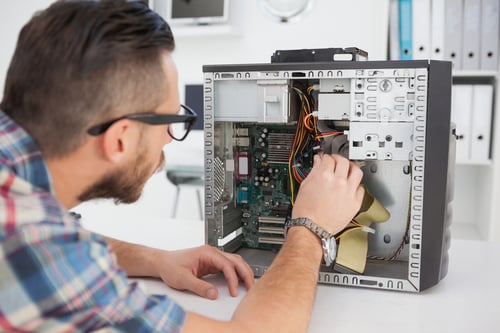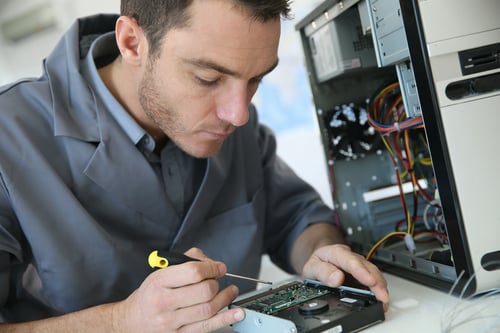Something I’ve seen a lot of over the last few weeks is a rare sight. The return of dinosaurs. Okay...
Computer/Workstation Recommendations - Late 2022
This is an update of a prior post on Personal Computer Recommendations from 2016. It has been updated for Late 2022 and looking into 2023.
While we professionally manage computers and workstations in business environments, we are frequently asked for recommendations for personal computers for home use. While needs can vary greatly, I will try to provide some standard recommendations for the typical environmental. Gamers, video editors and other types will probably not find our suggestions sufficient and higher end configurations are definitely available for those in the need.
Our Standard Build and Costs
As of this writing in December 2022, our standard PC recommendation for most typical business users costs about $1100-1200. That is an i5-1240P with 16 GB Memory/RAM and a 256-512 GB SSD. Some clients rely on servers for file sharing and don't need much disk space. Others rely more on the cloud and syncing files, so they need a larger drive.
A configuration for a power user with an i7-1260P, 32 GB RAM and 512 GB SSD runs about $1500.
A 14" laptop in a similar configuration runs about $1500.
All workstations support 2-4 monitors out of the box and come with a business friendly 3 year warranty. As many businesses are keeping computers longer, the desktop warranty can be extended out to 5 years for an extra $125.
I offer these numbers to keep in mind as you're shopping. Our devices will also be shipped Autopilot ready, either registered to your Microsoft 365 tenant or ready for self-registration. Autopilot saves times when setting up a new PC for organizations that are utilizing Microsoft 365 by skipping a lot of the tedious PC setup and taking users directly to a sign in screen. After signing in, many line of business applications can be automatically installed and configured.
Hardware Specifications
Processor/CPU: The lowest priced computers are going to have some likely underpowered processors that we would stay away from. You’re going to be best served with an Intel Core i5 or i7. If you’re shopping for a computer at Costco, you’ll likely get a great value, but you’re normally going to see higher end configurations. Our typical business configuration is an i5. Advanced users who frequently edit video or photos are going to want higher end machines with additional processing power.
Currently we are on the 12th generation i5 and i7 processors. You'll see this in the model number of the CPU. For example, i5-12450H and i7-1260P. The 12 after the - indicates it is a 12th generation processor. There isn't anything inherently wrong with buying an older processor like an 11th generation, but understand that you're getting last year's iPhone instead of this years model!
RAM or Memory: Don’t accept anything less than 8 GB, and more is better. Our typical configuration has 16 GB of RAM and 32 GB or more for power users. This is typically the easiest thing to upgrade, so you can buy a PC with less memory and then purchase additional memory separately or even at a later date. You can purchase additional memory at Crucial.com.
Hard Drive (Storage): Today there is no reason to look at any device that doesn't have a solid state drive (SSD). Operating systems and applications are built assuming that everyone is running a SSD. Some retail workstations will be bundled with a SSD and a spinning drive, but the cost difference is minimal so you really want all flash storage. It is also infrequent to see users actually utilize a second drive since the default storage location is your desktop or documents which is on the primary drive.
If you aren’t planning on storing lots of pictures, music, videos, etc. a 256 GB SSD may be sufficient, but most users will want at least 500 GB or 1 TB of storage. You can look at what space is used on your current disk as a guide and roughly plan to double the current utilized space.
Don't buy anything with less than 250 GB of storage. You'll run into problems even without any files on it when it comes to installing Windows updates.
Operating System (OS): Most retail PCs are going to come with Windows 11 Home. Everything should be 64 bit today, but RUN far far away from anything that is only 32 bit. For use in an office setting, you really need Windows 10/11 Pro. While it is possible to upgrade from Home to Pro (the license costs $100), one will have to setup the PC twice, possibly resulting in additional costs.
TPM (Trusted Platform Module): This helps secure your PC and you should strive to buy a PC that has a TPM built in. Microsoft says this is a requirement for Windows 11, but I've seen some conflicting information. Without a TPM you may need to enter a password every time you turn on the computer before it even gets to Windows.
Refurbished Computers
Finally, a note on refurbished computers. We seem to have hit a point where processor innovation isn't necessitating replacing a computer every three years. Buying a refurbished computer can appear to be a deal, and it might actually be a deal, but you need to do some comparisons to make sure. Officially Microsoft says you need an 8th generation Core i processor or later to run Windows. The release cycle doesn't exactly match up with calendar years, but for sake of argument, assume an 8th generation processor is ~4 years old. If we think this PC will last us another three years, then a brand new PC should last us 7 years.
Compare $1100/7 and whatever the refurb costs/4. That's your cost per year for the hardware. You should also consider the setup costs and the downtime of switching to a new PC. If we call it $500 to setup a new PC including IT costs and internal productivity, the new PC is $1600/7 or $228/year. For the refurb to come out ahead, it would need to cost less than $185 after subtracting the $500 in non-hardware costs.
For this reason, refurbished computers tend to make the most sense for personal use where your time may not have a direct cost.
There are a few other features we are concerned about when trying to remotely manage or maintain computers, but for personal use this should help you narrow down devices on your shopping list.
